A Sociological Perspective on Health, Healthcare, and Society
VerifiedAdded on 2023/06/12
|10
|2551
|52
Essay
AI Summary
This essay provides a sociological analysis of health and healthcare, examining functionalist, conflict, and symbolic interactionist perspectives. It discusses the concept of the 'sick role' within functionalism, highlighting the hierarchical relationship between nurses and patients. The conflict approach addresses inequalities in healthcare access based on socioeconomic status, while symbolic interactionism focuses on the social construction of illness and the power dynamics between healthcare providers and patients. Communication in healthcare, particularly the role of nurses, is explored in terms of knowledge and power. The essay concludes by considering the impact of power and hierarchy on health workers, particularly the challenges of empowerment within the nursing profession and the disparities between private and public healthcare sectors. Desklib offers a wealth of resources, including similar essays and study tools, to support students in their academic endeavors.
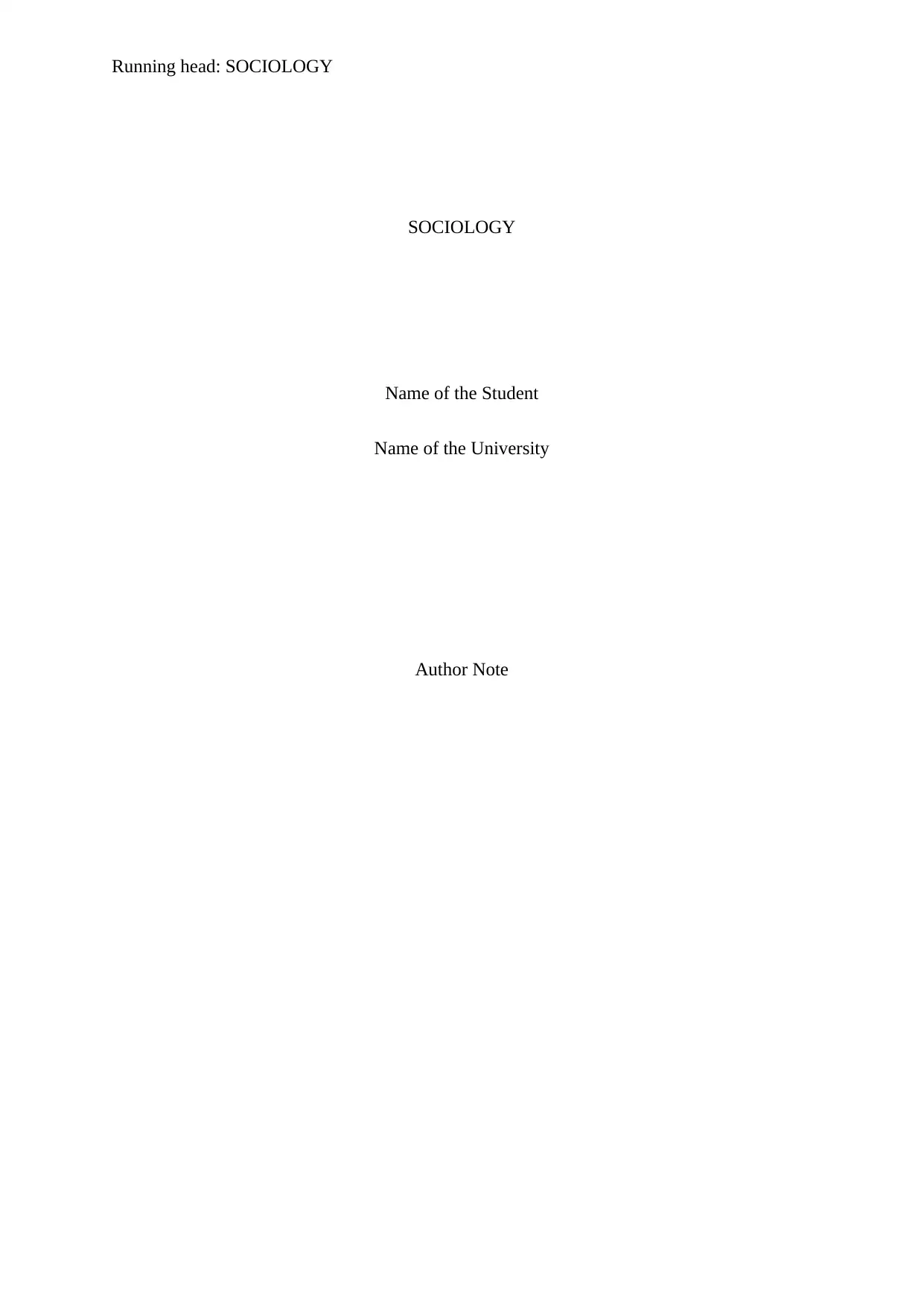
Running head: SOCIOLOGY
SOCIOLOGY
Name of the Student
Name of the University
Author Note
SOCIOLOGY
Name of the Student
Name of the University
Author Note
Paraphrase This Document
Need a fresh take? Get an instant paraphrase of this document with our AI Paraphraser
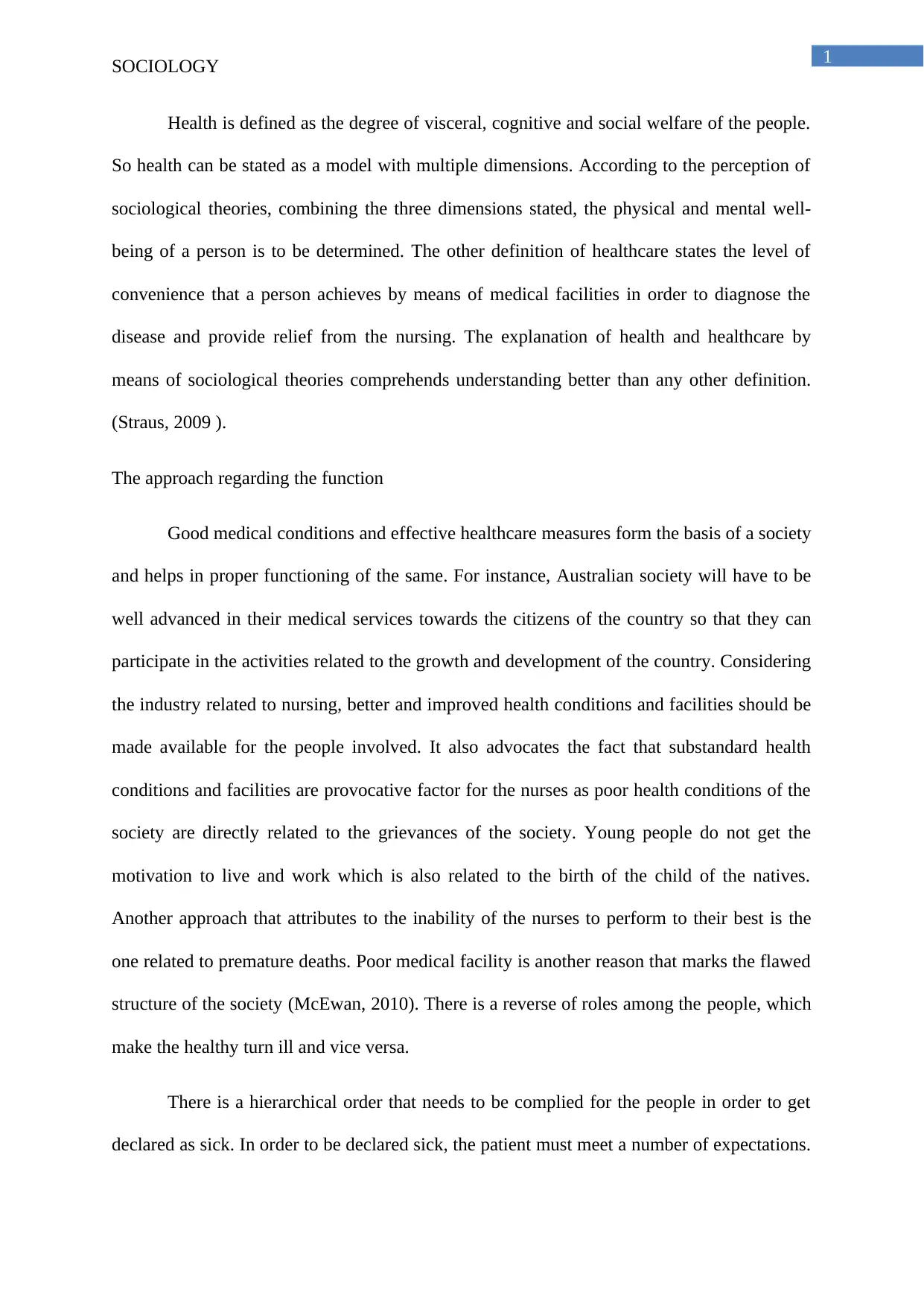
1
SOCIOLOGY
Health is defined as the degree of visceral, cognitive and social welfare of the people.
So health can be stated as a model with multiple dimensions. According to the perception of
sociological theories, combining the three dimensions stated, the physical and mental well-
being of a person is to be determined. The other definition of healthcare states the level of
convenience that a person achieves by means of medical facilities in order to diagnose the
disease and provide relief from the nursing. The explanation of health and healthcare by
means of sociological theories comprehends understanding better than any other definition.
(Straus, 2009 ).
The approach regarding the function
Good medical conditions and effective healthcare measures form the basis of a society
and helps in proper functioning of the same. For instance, Australian society will have to be
well advanced in their medical services towards the citizens of the country so that they can
participate in the activities related to the growth and development of the country. Considering
the industry related to nursing, better and improved health conditions and facilities should be
made available for the people involved. It also advocates the fact that substandard health
conditions and facilities are provocative factor for the nurses as poor health conditions of the
society are directly related to the grievances of the society. Young people do not get the
motivation to live and work which is also related to the birth of the child of the natives.
Another approach that attributes to the inability of the nurses to perform to their best is the
one related to premature deaths. Poor medical facility is another reason that marks the flawed
structure of the society (McEwan, 2010). There is a reverse of roles among the people, which
make the healthy turn ill and vice versa.
There is a hierarchical order that needs to be complied for the people in order to get
declared as sick. In order to be declared sick, the patient must meet a number of expectations.
SOCIOLOGY
Health is defined as the degree of visceral, cognitive and social welfare of the people.
So health can be stated as a model with multiple dimensions. According to the perception of
sociological theories, combining the three dimensions stated, the physical and mental well-
being of a person is to be determined. The other definition of healthcare states the level of
convenience that a person achieves by means of medical facilities in order to diagnose the
disease and provide relief from the nursing. The explanation of health and healthcare by
means of sociological theories comprehends understanding better than any other definition.
(Straus, 2009 ).
The approach regarding the function
Good medical conditions and effective healthcare measures form the basis of a society
and helps in proper functioning of the same. For instance, Australian society will have to be
well advanced in their medical services towards the citizens of the country so that they can
participate in the activities related to the growth and development of the country. Considering
the industry related to nursing, better and improved health conditions and facilities should be
made available for the people involved. It also advocates the fact that substandard health
conditions and facilities are provocative factor for the nurses as poor health conditions of the
society are directly related to the grievances of the society. Young people do not get the
motivation to live and work which is also related to the birth of the child of the natives.
Another approach that attributes to the inability of the nurses to perform to their best is the
one related to premature deaths. Poor medical facility is another reason that marks the flawed
structure of the society (McEwan, 2010). There is a reverse of roles among the people, which
make the healthy turn ill and vice versa.
There is a hierarchical order that needs to be complied for the people in order to get
declared as sick. In order to be declared sick, the patient must meet a number of expectations.
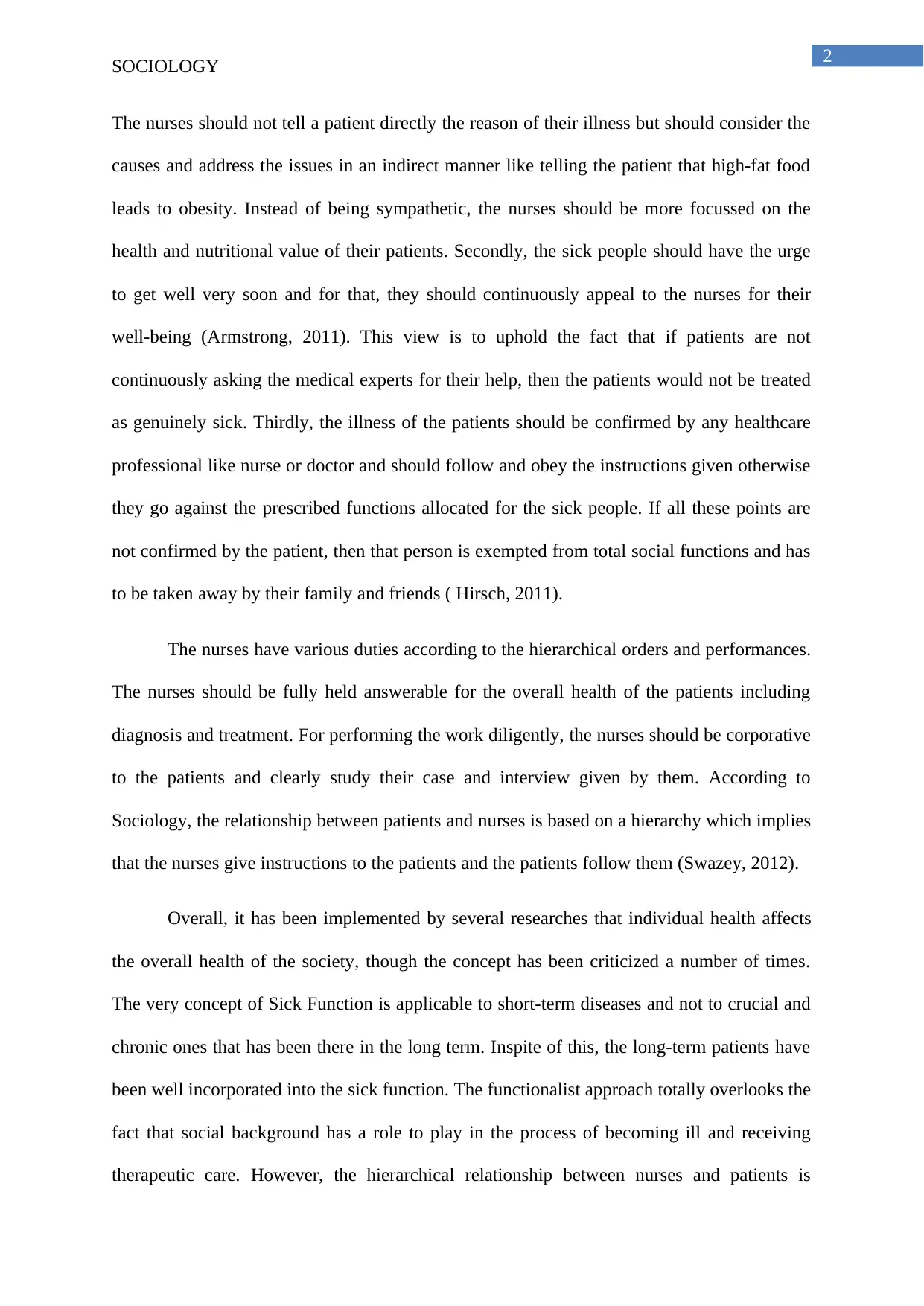
2
SOCIOLOGY
The nurses should not tell a patient directly the reason of their illness but should consider the
causes and address the issues in an indirect manner like telling the patient that high-fat food
leads to obesity. Instead of being sympathetic, the nurses should be more focussed on the
health and nutritional value of their patients. Secondly, the sick people should have the urge
to get well very soon and for that, they should continuously appeal to the nurses for their
well-being (Armstrong, 2011). This view is to uphold the fact that if patients are not
continuously asking the medical experts for their help, then the patients would not be treated
as genuinely sick. Thirdly, the illness of the patients should be confirmed by any healthcare
professional like nurse or doctor and should follow and obey the instructions given otherwise
they go against the prescribed functions allocated for the sick people. If all these points are
not confirmed by the patient, then that person is exempted from total social functions and has
to be taken away by their family and friends ( Hirsch, 2011).
The nurses have various duties according to the hierarchical orders and performances.
The nurses should be fully held answerable for the overall health of the patients including
diagnosis and treatment. For performing the work diligently, the nurses should be corporative
to the patients and clearly study their case and interview given by them. According to
Sociology, the relationship between patients and nurses is based on a hierarchy which implies
that the nurses give instructions to the patients and the patients follow them (Swazey, 2012).
Overall, it has been implemented by several researches that individual health affects
the overall health of the society, though the concept has been criticized a number of times.
The very concept of Sick Function is applicable to short-term diseases and not to crucial and
chronic ones that has been there in the long term. Inspite of this, the long-term patients have
been well incorporated into the sick function. The functionalist approach totally overlooks the
fact that social background has a role to play in the process of becoming ill and receiving
therapeutic care. However, the hierarchical relationship between nurses and patients is
SOCIOLOGY
The nurses should not tell a patient directly the reason of their illness but should consider the
causes and address the issues in an indirect manner like telling the patient that high-fat food
leads to obesity. Instead of being sympathetic, the nurses should be more focussed on the
health and nutritional value of their patients. Secondly, the sick people should have the urge
to get well very soon and for that, they should continuously appeal to the nurses for their
well-being (Armstrong, 2011). This view is to uphold the fact that if patients are not
continuously asking the medical experts for their help, then the patients would not be treated
as genuinely sick. Thirdly, the illness of the patients should be confirmed by any healthcare
professional like nurse or doctor and should follow and obey the instructions given otherwise
they go against the prescribed functions allocated for the sick people. If all these points are
not confirmed by the patient, then that person is exempted from total social functions and has
to be taken away by their family and friends ( Hirsch, 2011).
The nurses have various duties according to the hierarchical orders and performances.
The nurses should be fully held answerable for the overall health of the patients including
diagnosis and treatment. For performing the work diligently, the nurses should be corporative
to the patients and clearly study their case and interview given by them. According to
Sociology, the relationship between patients and nurses is based on a hierarchy which implies
that the nurses give instructions to the patients and the patients follow them (Swazey, 2012).
Overall, it has been implemented by several researches that individual health affects
the overall health of the society, though the concept has been criticized a number of times.
The very concept of Sick Function is applicable to short-term diseases and not to crucial and
chronic ones that has been there in the long term. Inspite of this, the long-term patients have
been well incorporated into the sick function. The functionalist approach totally overlooks the
fact that social background has a role to play in the process of becoming ill and receiving
therapeutic care. However, the hierarchical relationship between nurses and patients is
⊘ This is a preview!⊘
Do you want full access?
Subscribe today to unlock all pages.

Trusted by 1+ million students worldwide
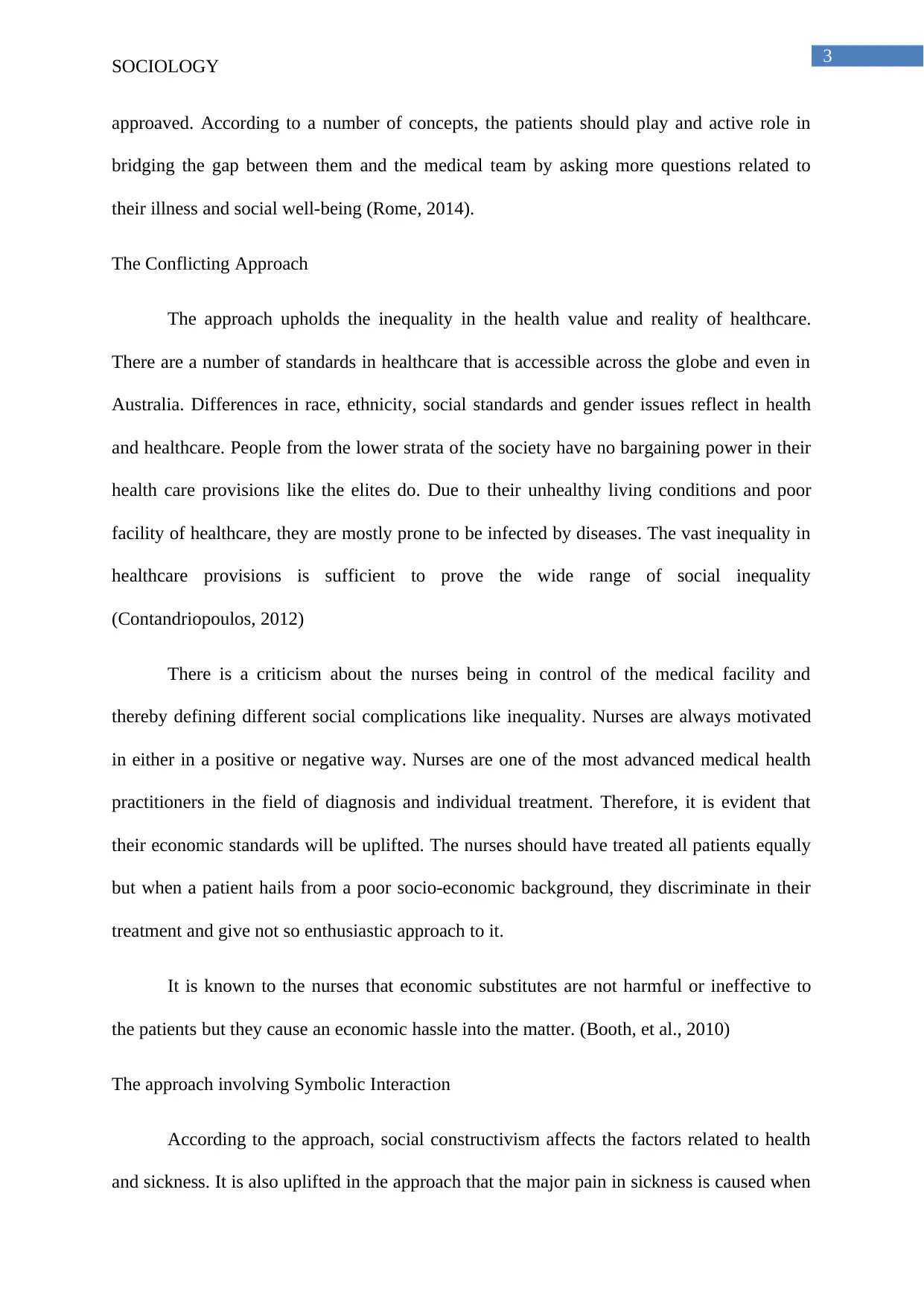
3
SOCIOLOGY
approaved. According to a number of concepts, the patients should play and active role in
bridging the gap between them and the medical team by asking more questions related to
their illness and social well-being (Rome, 2014).
The Conflicting Approach
The approach upholds the inequality in the health value and reality of healthcare.
There are a number of standards in healthcare that is accessible across the globe and even in
Australia. Differences in race, ethnicity, social standards and gender issues reflect in health
and healthcare. People from the lower strata of the society have no bargaining power in their
health care provisions like the elites do. Due to their unhealthy living conditions and poor
facility of healthcare, they are mostly prone to be infected by diseases. The vast inequality in
healthcare provisions is sufficient to prove the wide range of social inequality
(Contandriopoulos, 2012)
There is a criticism about the nurses being in control of the medical facility and
thereby defining different social complications like inequality. Nurses are always motivated
in either in a positive or negative way. Nurses are one of the most advanced medical health
practitioners in the field of diagnosis and individual treatment. Therefore, it is evident that
their economic standards will be uplifted. The nurses should have treated all patients equally
but when a patient hails from a poor socio-economic background, they discriminate in their
treatment and give not so enthusiastic approach to it.
It is known to the nurses that economic substitutes are not harmful or ineffective to
the patients but they cause an economic hassle into the matter. (Booth, et al., 2010)
The approach involving Symbolic Interaction
According to the approach, social constructivism affects the factors related to health
and sickness. It is also uplifted in the approach that the major pain in sickness is caused when
SOCIOLOGY
approaved. According to a number of concepts, the patients should play and active role in
bridging the gap between them and the medical team by asking more questions related to
their illness and social well-being (Rome, 2014).
The Conflicting Approach
The approach upholds the inequality in the health value and reality of healthcare.
There are a number of standards in healthcare that is accessible across the globe and even in
Australia. Differences in race, ethnicity, social standards and gender issues reflect in health
and healthcare. People from the lower strata of the society have no bargaining power in their
health care provisions like the elites do. Due to their unhealthy living conditions and poor
facility of healthcare, they are mostly prone to be infected by diseases. The vast inequality in
healthcare provisions is sufficient to prove the wide range of social inequality
(Contandriopoulos, 2012)
There is a criticism about the nurses being in control of the medical facility and
thereby defining different social complications like inequality. Nurses are always motivated
in either in a positive or negative way. Nurses are one of the most advanced medical health
practitioners in the field of diagnosis and individual treatment. Therefore, it is evident that
their economic standards will be uplifted. The nurses should have treated all patients equally
but when a patient hails from a poor socio-economic background, they discriminate in their
treatment and give not so enthusiastic approach to it.
It is known to the nurses that economic substitutes are not harmful or ineffective to
the patients but they cause an economic hassle into the matter. (Booth, et al., 2010)
The approach involving Symbolic Interaction
According to the approach, social constructivism affects the factors related to health
and sickness. It is also uplifted in the approach that the major pain in sickness is caused when
Paraphrase This Document
Need a fresh take? Get an instant paraphrase of this document with our AI Paraphraser
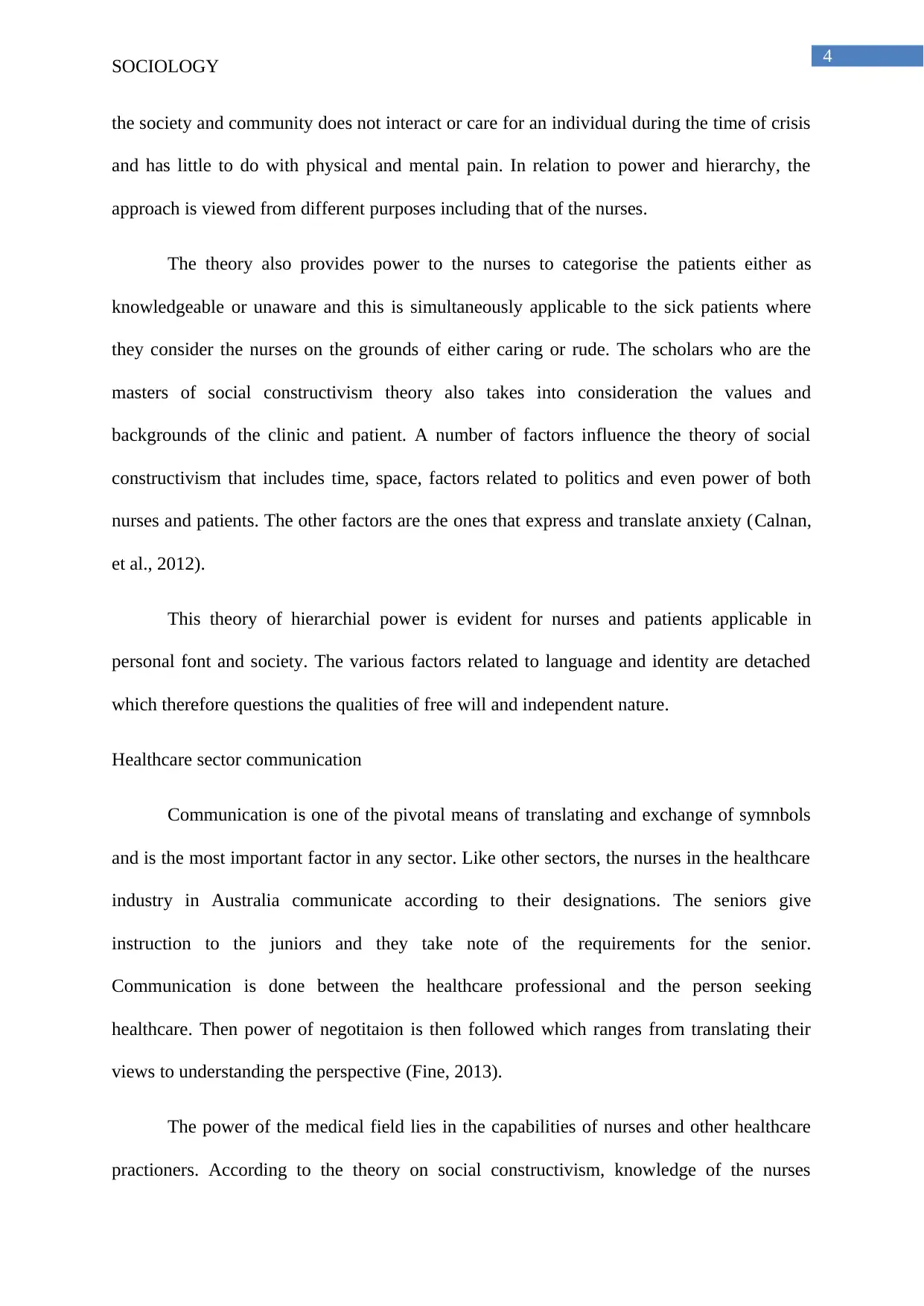
4
SOCIOLOGY
the society and community does not interact or care for an individual during the time of crisis
and has little to do with physical and mental pain. In relation to power and hierarchy, the
approach is viewed from different purposes including that of the nurses.
The theory also provides power to the nurses to categorise the patients either as
knowledgeable or unaware and this is simultaneously applicable to the sick patients where
they consider the nurses on the grounds of either caring or rude. The scholars who are the
masters of social constructivism theory also takes into consideration the values and
backgrounds of the clinic and patient. A number of factors influence the theory of social
constructivism that includes time, space, factors related to politics and even power of both
nurses and patients. The other factors are the ones that express and translate anxiety (Calnan,
et al., 2012).
This theory of hierarchial power is evident for nurses and patients applicable in
personal font and society. The various factors related to language and identity are detached
which therefore questions the qualities of free will and independent nature.
Healthcare sector communication
Communication is one of the pivotal means of translating and exchange of symnbols
and is the most important factor in any sector. Like other sectors, the nurses in the healthcare
industry in Australia communicate according to their designations. The seniors give
instruction to the juniors and they take note of the requirements for the senior.
Communication is done between the healthcare professional and the person seeking
healthcare. Then power of negotitaion is then followed which ranges from translating their
views to understanding the perspective (Fine, 2013).
The power of the medical field lies in the capabilities of nurses and other healthcare
practioners. According to the theory on social constructivism, knowledge of the nurses
SOCIOLOGY
the society and community does not interact or care for an individual during the time of crisis
and has little to do with physical and mental pain. In relation to power and hierarchy, the
approach is viewed from different purposes including that of the nurses.
The theory also provides power to the nurses to categorise the patients either as
knowledgeable or unaware and this is simultaneously applicable to the sick patients where
they consider the nurses on the grounds of either caring or rude. The scholars who are the
masters of social constructivism theory also takes into consideration the values and
backgrounds of the clinic and patient. A number of factors influence the theory of social
constructivism that includes time, space, factors related to politics and even power of both
nurses and patients. The other factors are the ones that express and translate anxiety (Calnan,
et al., 2012).
This theory of hierarchial power is evident for nurses and patients applicable in
personal font and society. The various factors related to language and identity are detached
which therefore questions the qualities of free will and independent nature.
Healthcare sector communication
Communication is one of the pivotal means of translating and exchange of symnbols
and is the most important factor in any sector. Like other sectors, the nurses in the healthcare
industry in Australia communicate according to their designations. The seniors give
instruction to the juniors and they take note of the requirements for the senior.
Communication is done between the healthcare professional and the person seeking
healthcare. Then power of negotitaion is then followed which ranges from translating their
views to understanding the perspective (Fine, 2013).
The power of the medical field lies in the capabilities of nurses and other healthcare
practioners. According to the theory on social constructivism, knowledge of the nurses
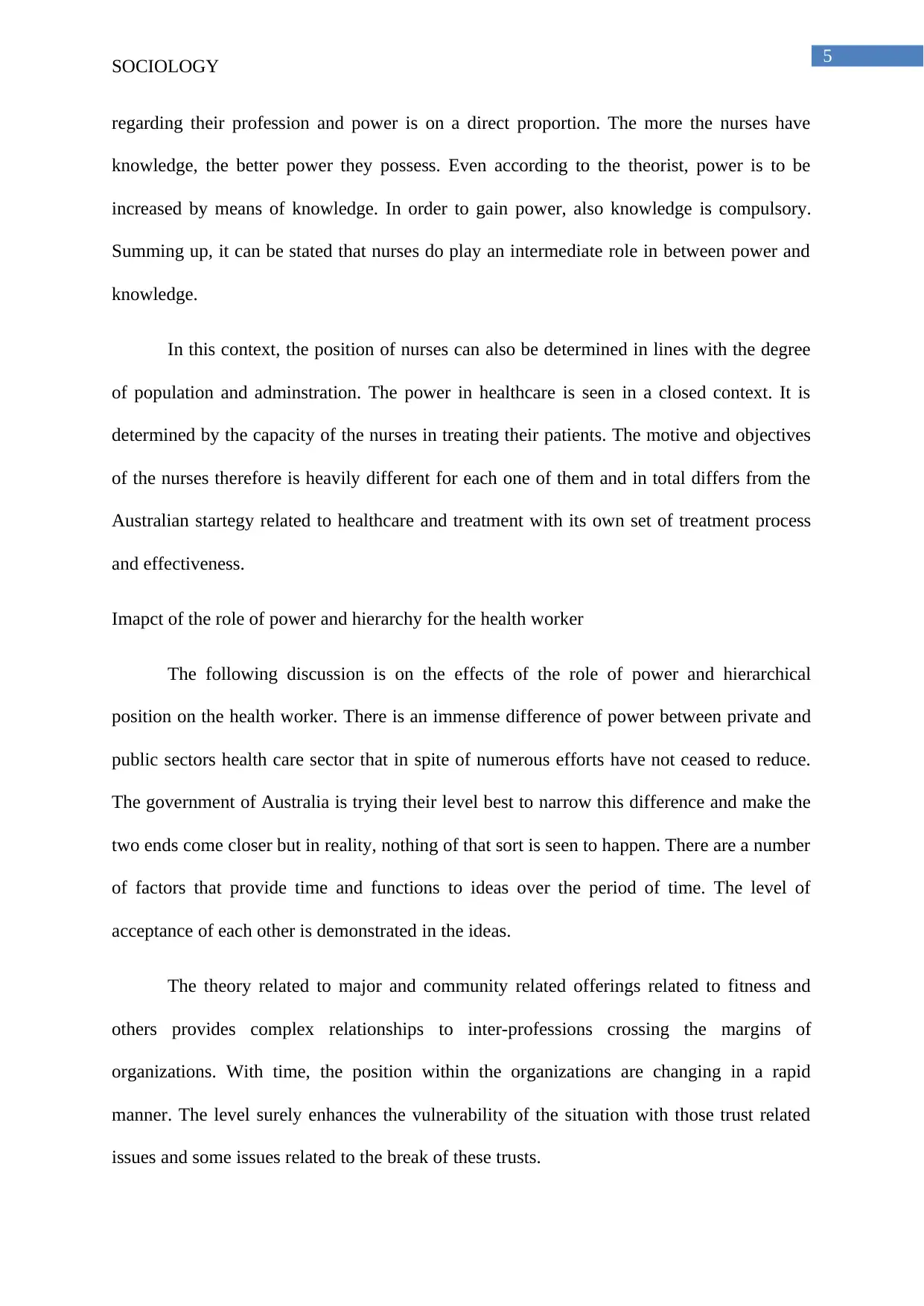
5
SOCIOLOGY
regarding their profession and power is on a direct proportion. The more the nurses have
knowledge, the better power they possess. Even according to the theorist, power is to be
increased by means of knowledge. In order to gain power, also knowledge is compulsory.
Summing up, it can be stated that nurses do play an intermediate role in between power and
knowledge.
In this context, the position of nurses can also be determined in lines with the degree
of population and adminstration. The power in healthcare is seen in a closed context. It is
determined by the capacity of the nurses in treating their patients. The motive and objectives
of the nurses therefore is heavily different for each one of them and in total differs from the
Australian startegy related to healthcare and treatment with its own set of treatment process
and effectiveness.
Imapct of the role of power and hierarchy for the health worker
The following discussion is on the effects of the role of power and hierarchical
position on the health worker. There is an immense difference of power between private and
public sectors health care sector that in spite of numerous efforts have not ceased to reduce.
The government of Australia is trying their level best to narrow this difference and make the
two ends come closer but in reality, nothing of that sort is seen to happen. There are a number
of factors that provide time and functions to ideas over the period of time. The level of
acceptance of each other is demonstrated in the ideas.
The theory related to major and community related offerings related to fitness and
others provides complex relationships to inter-professions crossing the margins of
organizations. With time, the position within the organizations are changing in a rapid
manner. The level surely enhances the vulnerability of the situation with those trust related
issues and some issues related to the break of these trusts.
SOCIOLOGY
regarding their profession and power is on a direct proportion. The more the nurses have
knowledge, the better power they possess. Even according to the theorist, power is to be
increased by means of knowledge. In order to gain power, also knowledge is compulsory.
Summing up, it can be stated that nurses do play an intermediate role in between power and
knowledge.
In this context, the position of nurses can also be determined in lines with the degree
of population and adminstration. The power in healthcare is seen in a closed context. It is
determined by the capacity of the nurses in treating their patients. The motive and objectives
of the nurses therefore is heavily different for each one of them and in total differs from the
Australian startegy related to healthcare and treatment with its own set of treatment process
and effectiveness.
Imapct of the role of power and hierarchy for the health worker
The following discussion is on the effects of the role of power and hierarchical
position on the health worker. There is an immense difference of power between private and
public sectors health care sector that in spite of numerous efforts have not ceased to reduce.
The government of Australia is trying their level best to narrow this difference and make the
two ends come closer but in reality, nothing of that sort is seen to happen. There are a number
of factors that provide time and functions to ideas over the period of time. The level of
acceptance of each other is demonstrated in the ideas.
The theory related to major and community related offerings related to fitness and
others provides complex relationships to inter-professions crossing the margins of
organizations. With time, the position within the organizations are changing in a rapid
manner. The level surely enhances the vulnerability of the situation with those trust related
issues and some issues related to the break of these trusts.
⊘ This is a preview!⊘
Do you want full access?
Subscribe today to unlock all pages.

Trusted by 1+ million students worldwide
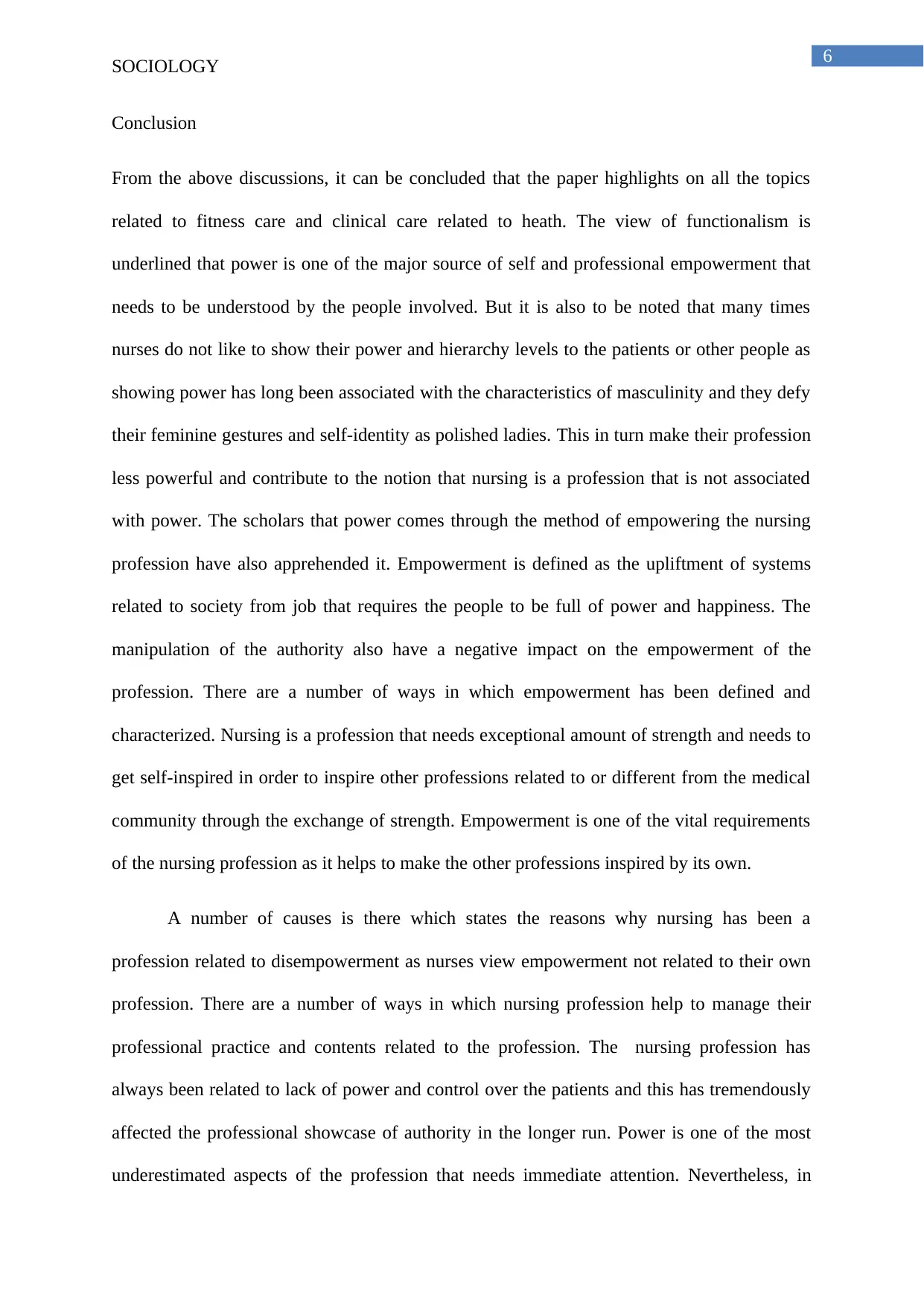
6
SOCIOLOGY
Conclusion
From the above discussions, it can be concluded that the paper highlights on all the topics
related to fitness care and clinical care related to heath. The view of functionalism is
underlined that power is one of the major source of self and professional empowerment that
needs to be understood by the people involved. But it is also to be noted that many times
nurses do not like to show their power and hierarchy levels to the patients or other people as
showing power has long been associated with the characteristics of masculinity and they defy
their feminine gestures and self-identity as polished ladies. This in turn make their profession
less powerful and contribute to the notion that nursing is a profession that is not associated
with power. The scholars that power comes through the method of empowering the nursing
profession have also apprehended it. Empowerment is defined as the upliftment of systems
related to society from job that requires the people to be full of power and happiness. The
manipulation of the authority also have a negative impact on the empowerment of the
profession. There are a number of ways in which empowerment has been defined and
characterized. Nursing is a profession that needs exceptional amount of strength and needs to
get self-inspired in order to inspire other professions related to or different from the medical
community through the exchange of strength. Empowerment is one of the vital requirements
of the nursing profession as it helps to make the other professions inspired by its own.
A number of causes is there which states the reasons why nursing has been a
profession related to disempowerment as nurses view empowerment not related to their own
profession. There are a number of ways in which nursing profession help to manage their
professional practice and contents related to the profession. The nursing profession has
always been related to lack of power and control over the patients and this has tremendously
affected the professional showcase of authority in the longer run. Power is one of the most
underestimated aspects of the profession that needs immediate attention. Nevertheless, in
SOCIOLOGY
Conclusion
From the above discussions, it can be concluded that the paper highlights on all the topics
related to fitness care and clinical care related to heath. The view of functionalism is
underlined that power is one of the major source of self and professional empowerment that
needs to be understood by the people involved. But it is also to be noted that many times
nurses do not like to show their power and hierarchy levels to the patients or other people as
showing power has long been associated with the characteristics of masculinity and they defy
their feminine gestures and self-identity as polished ladies. This in turn make their profession
less powerful and contribute to the notion that nursing is a profession that is not associated
with power. The scholars that power comes through the method of empowering the nursing
profession have also apprehended it. Empowerment is defined as the upliftment of systems
related to society from job that requires the people to be full of power and happiness. The
manipulation of the authority also have a negative impact on the empowerment of the
profession. There are a number of ways in which empowerment has been defined and
characterized. Nursing is a profession that needs exceptional amount of strength and needs to
get self-inspired in order to inspire other professions related to or different from the medical
community through the exchange of strength. Empowerment is one of the vital requirements
of the nursing profession as it helps to make the other professions inspired by its own.
A number of causes is there which states the reasons why nursing has been a
profession related to disempowerment as nurses view empowerment not related to their own
profession. There are a number of ways in which nursing profession help to manage their
professional practice and contents related to the profession. The nursing profession has
always been related to lack of power and control over the patients and this has tremendously
affected the professional showcase of authority in the longer run. Power is one of the most
underestimated aspects of the profession that needs immediate attention. Nevertheless, in
Paraphrase This Document
Need a fresh take? Get an instant paraphrase of this document with our AI Paraphraser
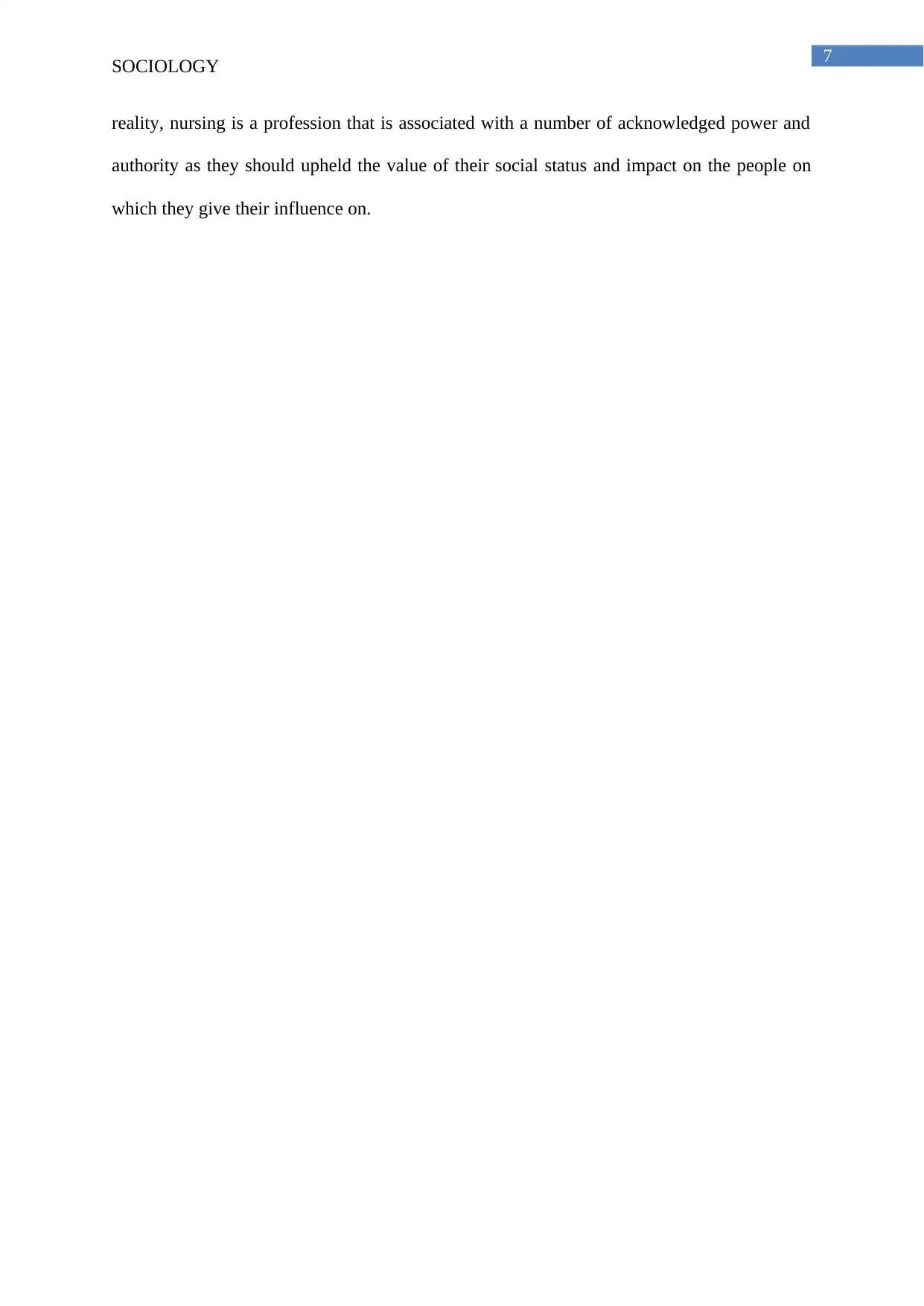
7
SOCIOLOGY
reality, nursing is a profession that is associated with a number of acknowledged power and
authority as they should upheld the value of their social status and impact on the people on
which they give their influence on.
SOCIOLOGY
reality, nursing is a profession that is associated with a number of acknowledged power and
authority as they should upheld the value of their social status and impact on the people on
which they give their influence on.
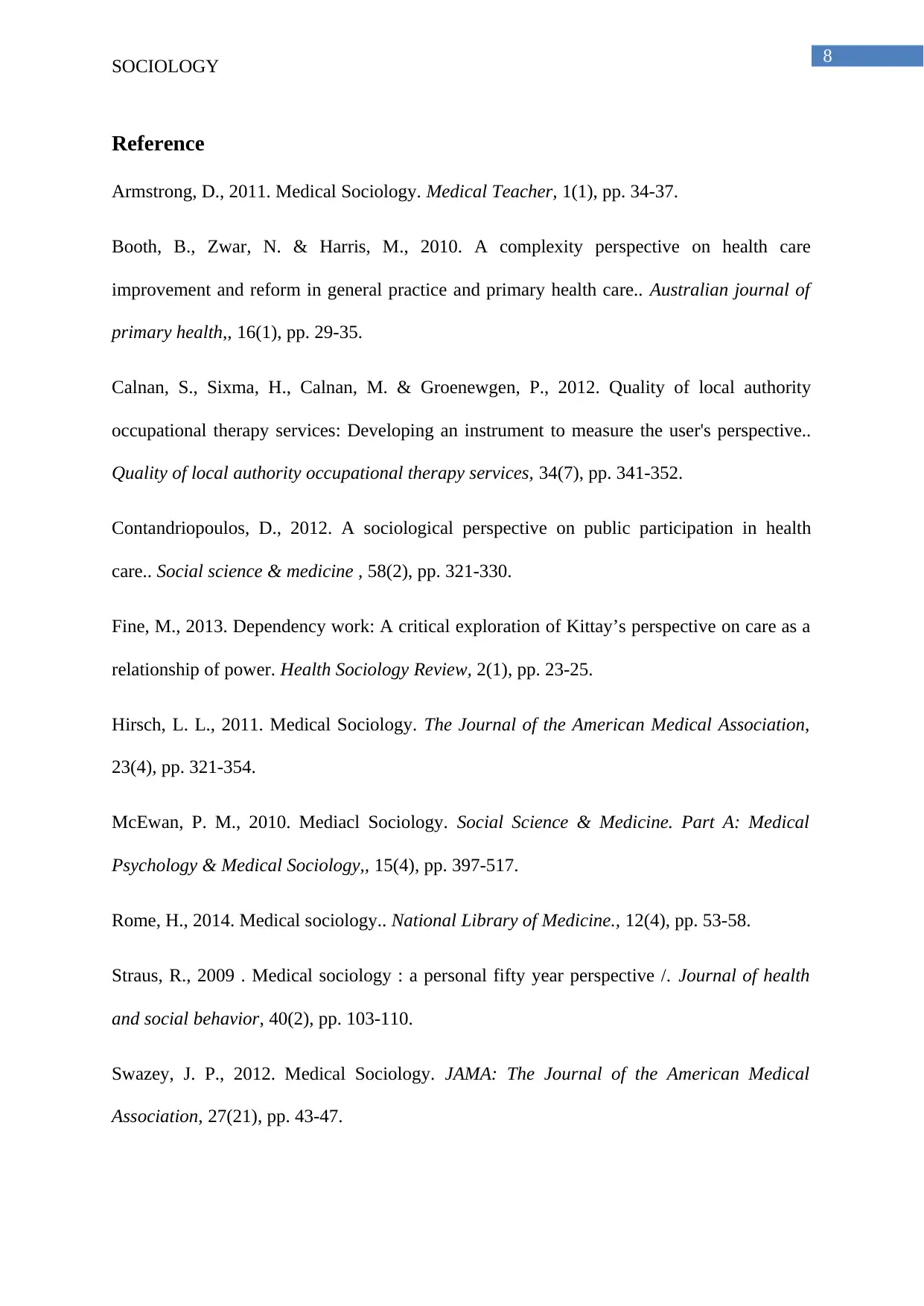
8
SOCIOLOGY
Reference
Armstrong, D., 2011. Medical Sociology. Medical Teacher, 1(1), pp. 34-37.
Booth, B., Zwar, N. & Harris, M., 2010. A complexity perspective on health care
improvement and reform in general practice and primary health care.. Australian journal of
primary health,, 16(1), pp. 29-35.
Calnan, S., Sixma, H., Calnan, M. & Groenewgen, P., 2012. Quality of local authority
occupational therapy services: Developing an instrument to measure the user's perspective..
Quality of local authority occupational therapy services, 34(7), pp. 341-352.
Contandriopoulos, D., 2012. A sociological perspective on public participation in health
care.. Social science & medicine , 58(2), pp. 321-330.
Fine, M., 2013. Dependency work: A critical exploration of Kittay’s perspective on care as a
relationship of power. Health Sociology Review, 2(1), pp. 23-25.
Hirsch, L. L., 2011. Medical Sociology. The Journal of the American Medical Association,
23(4), pp. 321-354.
McEwan, P. M., 2010. Mediacl Sociology. Social Science & Medicine. Part A: Medical
Psychology & Medical Sociology,, 15(4), pp. 397-517.
Rome, H., 2014. Medical sociology.. National Library of Medicine., 12(4), pp. 53-58.
Straus, R., 2009 . Medical sociology : a personal fifty year perspective /. Journal of health
and social behavior, 40(2), pp. 103-110.
Swazey, J. P., 2012. Medical Sociology. JAMA: The Journal of the American Medical
Association, 27(21), pp. 43-47.
SOCIOLOGY
Reference
Armstrong, D., 2011. Medical Sociology. Medical Teacher, 1(1), pp. 34-37.
Booth, B., Zwar, N. & Harris, M., 2010. A complexity perspective on health care
improvement and reform in general practice and primary health care.. Australian journal of
primary health,, 16(1), pp. 29-35.
Calnan, S., Sixma, H., Calnan, M. & Groenewgen, P., 2012. Quality of local authority
occupational therapy services: Developing an instrument to measure the user's perspective..
Quality of local authority occupational therapy services, 34(7), pp. 341-352.
Contandriopoulos, D., 2012. A sociological perspective on public participation in health
care.. Social science & medicine , 58(2), pp. 321-330.
Fine, M., 2013. Dependency work: A critical exploration of Kittay’s perspective on care as a
relationship of power. Health Sociology Review, 2(1), pp. 23-25.
Hirsch, L. L., 2011. Medical Sociology. The Journal of the American Medical Association,
23(4), pp. 321-354.
McEwan, P. M., 2010. Mediacl Sociology. Social Science & Medicine. Part A: Medical
Psychology & Medical Sociology,, 15(4), pp. 397-517.
Rome, H., 2014. Medical sociology.. National Library of Medicine., 12(4), pp. 53-58.
Straus, R., 2009 . Medical sociology : a personal fifty year perspective /. Journal of health
and social behavior, 40(2), pp. 103-110.
Swazey, J. P., 2012. Medical Sociology. JAMA: The Journal of the American Medical
Association, 27(21), pp. 43-47.
⊘ This is a preview!⊘
Do you want full access?
Subscribe today to unlock all pages.

Trusted by 1+ million students worldwide
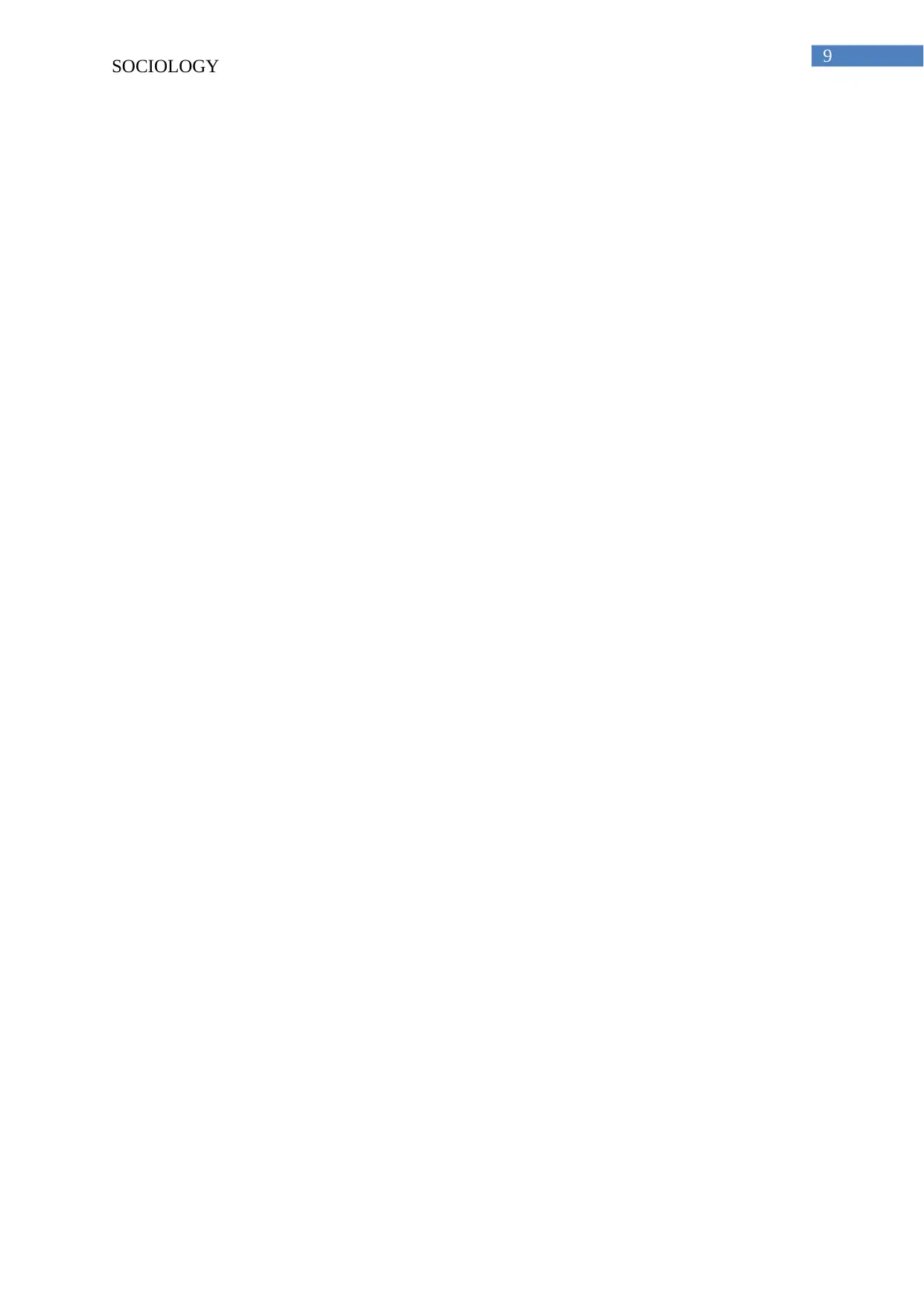
9
SOCIOLOGY
SOCIOLOGY
1 out of 10
Related Documents
Your All-in-One AI-Powered Toolkit for Academic Success.
+13062052269
info@desklib.com
Available 24*7 on WhatsApp / Email
![[object Object]](/_next/static/media/star-bottom.7253800d.svg)
Unlock your academic potential
Copyright © 2020–2026 A2Z Services. All Rights Reserved. Developed and managed by ZUCOL.





